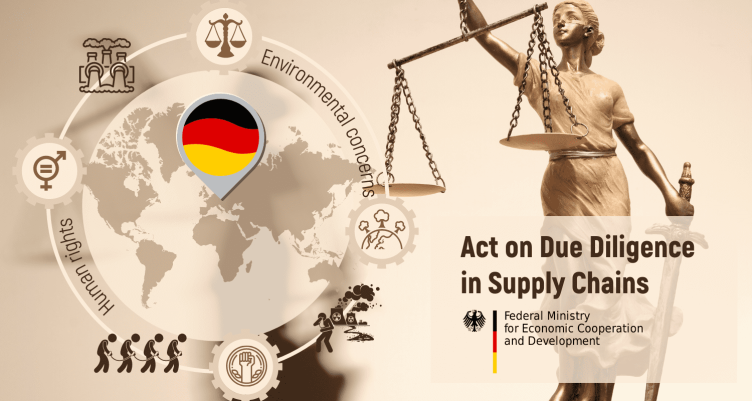
01 Oct, 2023
Understanding the German Supply Chain Due Diligence Act
The German Supply Chain Due Diligence Act (SCDDA) is a significant piece of legislation that aims to safeguard human rights and protect the environment within global supply chains. This act, which was published in the German Federal Law Gazette on July 22, 2021, will come into force on January 1, 2023. It introduces new obligations for companies operating in Germany, requiring them to establish due diligence procedures to prevent or minimize risks related to human rights and the environment.
Scope of the Supply Chain Due Diligence Act
The Supply Chain Due Diligence Act applies to companies that have their central administration, principal place of business, administrative headquarters, registered seat, or branch office in Germany and employ 3,000 or more employees within the country. Starting from January 1, 2024, the act will also encompass companies with more than 1,000 employees. It's important to note that even smaller companies may be indirectly affected by these obligations if they are suppliers to larger companies covered by the act.
Risks Related to Human Rights and the Environment
The act defines specific risks related to human rights and the environment that companies must address within their supply chains. These risks include prohibitions on child labor, forced labor, slavery, workplace safety violations, discrimination, environmental degradation, and more. The aim is to identify and mitigate these risks to ensure compliance with international standards and prevent human rights and environmental violations.
Due Diligence Procedures
To comply with the Supply Chain Due Diligence Act, companies must establish a series of due diligence procedures within their supply chains. These procedures include:
- Risk Management System: Companies must develop a risk management system that identifies and assesses human rights and environmental risks. This system should aim to prevent or minimize the potential harms associated with these risks.
- Internal Responsibility: Companies should designate a responsible person or human rights ombudsperson within the organization to oversee compliance with the risk management system and related procedures.
- Regular Risk Analyses: Regular risk analyses should be conducted to identify potential human rights and environmental risks within the company's business area and among its direct suppliers. These analyses should consider factors such as working conditions, labor practices, environmental impact, and more.
- Policy Statement: Companies must adopt a policy statement that outlines their approach to human rights and environmental due diligence. This statement should communicate the company's priorities, preventive measures, and remedial actions.
- Preventive Measures: Companies must implement preventive measures within their own business area and among their direct suppliers to address identified risks. This may involve training programs, supplier codes of conduct, and sustainable procurement practices.
- Remedial Actions: If a violation of human rights or environmental standards is discovered or imminent, companies must take immediate action to prevent, end, or minimize the violation. This may include corrective measures, suspending relationships with non-compliant suppliers, and implementing a concrete timetable for resolving the violation.
- Internal Complaints Procedure: Companies must establish an internal complaints procedure that allows individuals to report human rights and environmental violations within the supply chain. This procedure should ensure confidentiality and provide a mechanism for resolving complaints.
- Indirect Suppliers: Companies must also address risks associated with indirect suppliers by conducting risk analyses and implementing appropriate due diligence procedures when violations are substantiated.
- Documentation and Reporting: Companies are required to document their due diligence procedures, the risks identified, and the measures taken. They must also publish an annual report on their website, detailing their compliance efforts and making it publicly available.
Sanctions and Legal Actions
Non-compliance with the Supply Chain Due Diligence Act can result in fines for companies. The severity of the violation will determine the amount of the fine, with larger companies facing fines of up to 2% of their annual global turnover. Additionally, companies that fail to comply may be excluded from winning public contracts in Germany for a period of up to three years.
Conclusion
The German Supply Chain Due Diligence Act represents a significant step towards ensuring human rights and environmental protection within global supply chains. Companies operating in Germany must establish robust due diligence procedures to identify and address risks related to human rights and the environment. By implementing these procedures, companies can contribute to the creation of more ethical and sustainable supply chains, ultimately benefiting society and the planet as a whole.